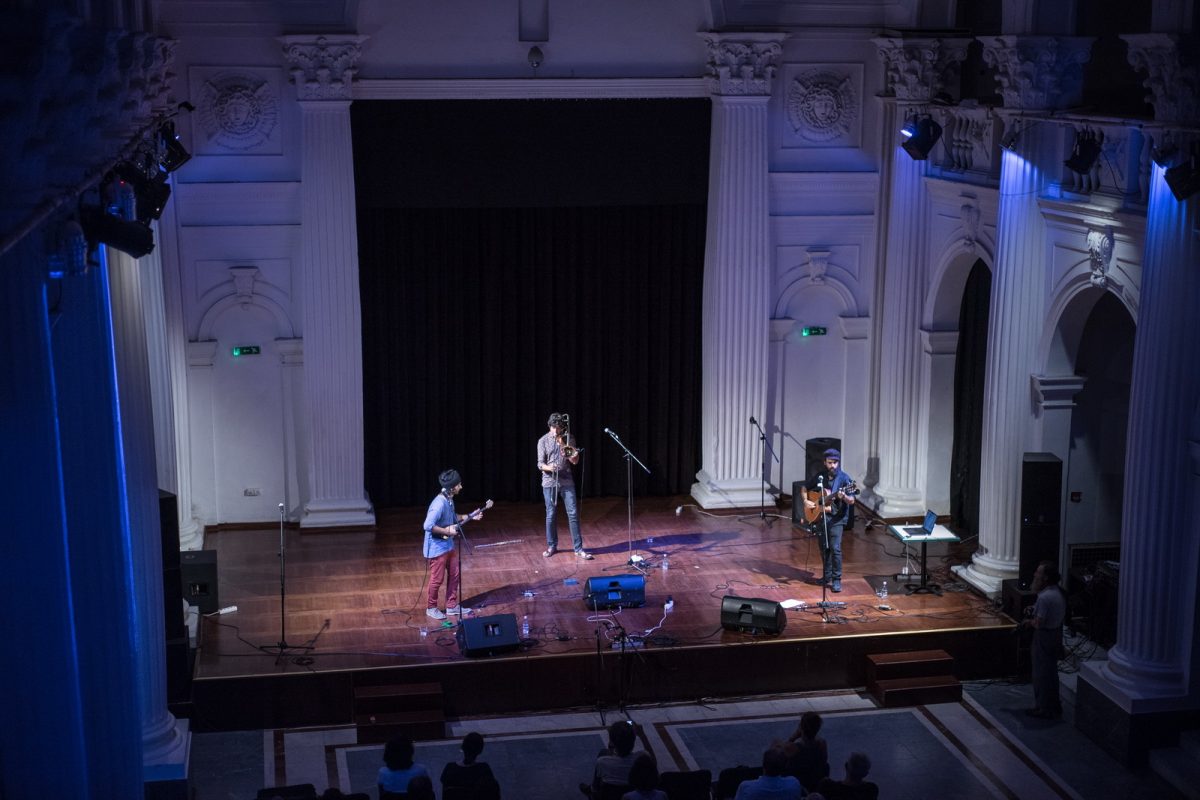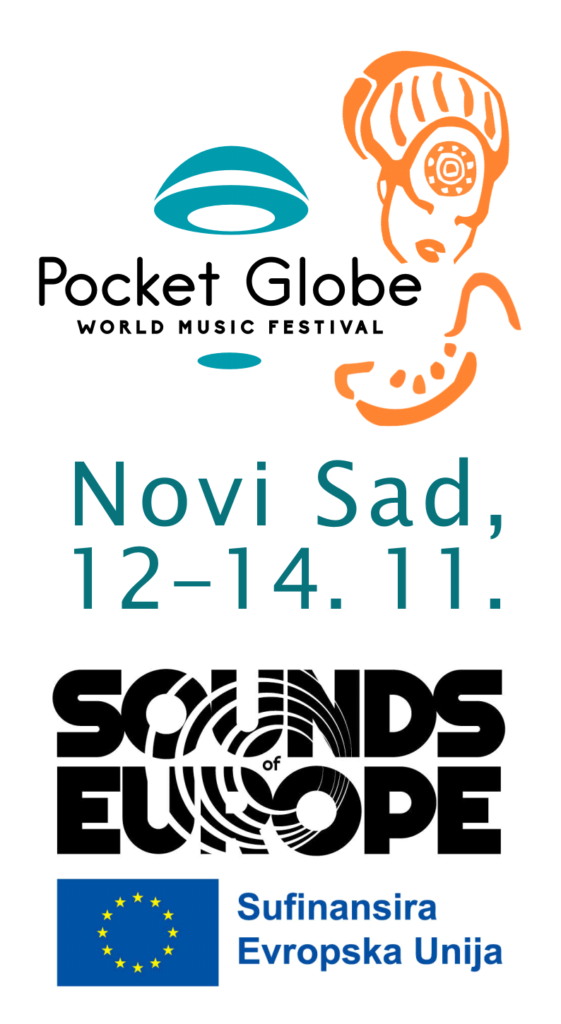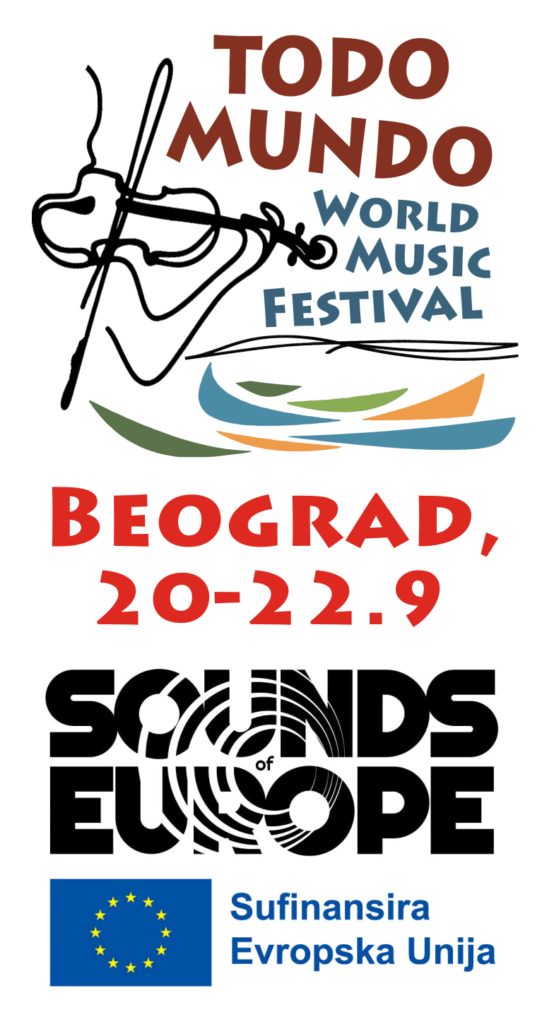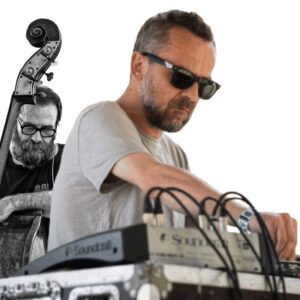Rubrika: Profilisanje
Digging in the tradition and everyday life of Cyprus
Monsieur Doumani, a striking, unique troika from Cyprus, will play the concert at the Belgrade club DIM on May 3rd, starting at 8 pm. That was the reason for the interview with Antonis Antoniu. Tickets for the concert, advance tickets – 300 RSD, can be purchased at clubs DIM and Zaokret (Cetinjska 15); at the door on the day of the concert tickets will cost 500 RSD.
Author: Marija Vitas

Monsieur Doumani. Foto: Eleni Papadopoulou
Monsieur Doumani were founded by Antonis Antoniou (tzouras / voice) in Nicosia, Angelos Ionas (guitar; outside of Cyprus guitarist Angelos is substituted by Andys Skordis) and Demetris Yiasemides, trombone / flute) back in 2011. Each release of the group has taken a step further in a career that has recently reached the worldwide stages, attracting more and more people, while collecting awards from prestigious magazines, as well as top-notch sites. The first EP Cyfolk (2012) brought 8 original arrangements of Cypriot folk songs.
With the first album Grippy Grappa (2013), where arrangement of tradition were still the dominant, with some discreet authorship, the name of the band Monsieur Doumani began to reach the ears of world music fans and critics outside of Cyprus and the region, ranking amongst others on the list of the best albums of the UK magazine – “Songlinesˮ. Their third album Sikoses (2015) was new step of the band –their own songs were dominated. The album was No 1 on the charts of the World Music Network in June and the Transglobal World Music Chart in November of the same year.
When the third studio album of Monsieur Doumani, Angathin, appeared in February 2018, it became clear that this Cypriot trio turned into a new big name of the world’s world music scene. The album won the prestigious “Preis der Deutschen Schallplattenkritikˮ” in the World Music category, and was named the best album of 2018 by the choice of Transglobal World Music Chart, and came in 6th place among the best albums that year following the decision of World Music Charts Europe, as in the Top 20 albums from 2018, according to the magazine “fRoots”

Monsieur Doumani na festivalu „Todo Mundoˮ u Beogradu, SKC, 2018. Foto: Srđan Veljović
Since 2011, since your existence as a trio, your career and reputation outside of Cyprus has been intensely developed. In proportion to the success in Europe, have you also grown in Cyprus and become big stars on the island?
No, we wouldn’t use the words big stars! However, the Cypriot audience embraced our music and we have to admit that they are very warm and supportive. All our concerts here are sold out with enthusiastic people but we choose not to perform on a regular basis. We try to make each performance a special experience for everyone. Nowadays most of our concerts are actually abroad, so even though Cyprus is a small island, there are still many people who don’t know who we are.
What was your main motive when you gathered in 2011? The biography of the band states that three of you have different music backgrounds.
Our main motive was to dig up in our musical tradition and try to bring out something new and creative out of it, a new sound. We came back from our studies, each of us coming from a different musical background and we started rehearsing and playing around on some well-known traditional songs. We soon discovered that we were actually quite satisfied with the results of our experiments so we decided to record an album. After some positive reviews from various media all around the world we started to compose our own music and now we have already released 3 albums.
The music of the trio Monsieur Doumani was soaked by the Cypriot tradition, but at the same time, in various ways, it was re-examined, refreshed, torn. Already a blend of trombone or flute with a Greek wire instrument (tzouras) and a guitar promises an unusual, fun, momentous “expression. Once added to verses related to contemporary Cypriot society and climatic conditions that generally adorn our epoch, the whole atmosphere wrapped around some of the band’s albums or their concert gets the influence of healthy humor, fine irony and good flirtation.
You started with the rearrangements of the traditional melodies, and slowly developed the authorship, which culminated on the last album ‘’Angathin’’. Does it mean that meanwhile, you have penetrated deeply into the secrets of local folklore, so it all comes out naturally more and more from you while you compose your own songs? How much did you deal with Cyprus folklore before the band was formed?
We are not traditionalists and we are influenced not only by our own musical tradition but also from different musics and genres from different parts of the world. For instance, we are strongly influenced by the Balkan sounds, West African music, the rebetiko, the music of South Italy and many more. However, it’s true that the basis of our music is Cypriot traditional music. We all grew up listening to rock, pop and jazz. We knew some things about the Cypriot traditional music because of our parents but we have never thought that we will take these information and build something out of it. Since we started this project we discovered a lot of beautiful traditional melodies and dances that we were not aware of and this is a fantastic ongoing process.

Monsieur Doumani. Foto: Eleni Papadopoulou
You point out the Cyprus society’ and politics problems, as well as problems in contemporary life. Then, you fight against injustice, racism and corruption. But, your music is cheerful, dashing and fun in good part. Is your approach to the problems caricature, humorous, and do you consider yourself as a party band however, without putting main accent on messages full of criticism, rebellion, and so on?
It’s true that our albums are quite political, especially our last one, ’Angathin’. The truth is that we are and have always been very sensitive about political issues and we feel the need to pass political messages through our music. We feel that it is impossible to experience all this craziness around us without saying or doing something about it. We live in Nicosia, which is the capital of the island but also a divided city. There are checkpoints a few meters away from our houses and up until 2004 we couldn’t even pass to the other side and meet our neighbors.
We strongly believe in the unification and the demilitarization of the island and we fight for this every day. Inevitably our music is highly influenced by this situation but we also raise environmental issues, racism as well as political corruption etc. We choose humour because we believe that it has a more direct influence on people.
Moreover, humour has a hidden power which can be extremely effective. We don’t consider ourselves a party band even though we have many upbeat and humorous songs. Our last album has a different character which at times is very dark.
Which element of Cyprus music tradition makes your base for creating music, except, of course, the instrument tzouras itself in the arrangements?
Actually tzouras is not a Cypriot instrument. It’s a Greek instrument, a small scale bouzouki. Our instrumentation is very strange because it has nothing to do with the traditional Cypriot music ensemble which consists of a lute, a violin and a frame drum we call tamboutsia. Cypriot traditional music has some very beautiful melodies which we find very inspiring. Furthermore, the irregular rhythms of 5/8, 7/8, 9/8 which is a very strong characteristic of the Cypriot music is also an element we use a lot in our own compositions.

Monsieur Doumani na festivalu „Todo Mundoˮ u Beogradu, SKC, 2018. Foto: Srđan Veljović
Since the beginning of this year they have already played on 3 continents. Belgrade is the last destination on a spring tour, which also includes Greece, Spain, Belgium, the Netherlands, Denmark, Germany and Croatia. If you missed their first guest appearance in Serbia last year, at the “Todo Mundo” festival, this is an ideal opportunity. Monsieur Doumani is the name for a great gig, an interesting sound and a good party. Or, how do they like to say to themselves – “We are specialized in smoking, drinking brandy and performing music from the island of Cyprus.”
You are currently on EU tour, sometimes performing where you had not before. What is usual reaction of the European audience when they see and hear you for the first time?
It always depends on the venue we perform. Usually when we perform in open-air festivals the audience is always very enthusiastic. Everyone is dancing and singing with us. When we play in closed theatres people are more concentrated in listening to the music, paying attention to all the details of the arrangements and so on. For us both situations can be very interesting and we can’t decide what we prefer. On a general note we are very excited by the reaction we get in every country we visit.
Belgrade is the last stop on your tour – you performed here not so long ago. What are your impressions from the last visit?
Belgrade is definitely one of our favorite cities. We love the atmosphere in your city, the music, the food and of course the rakija! Last time we were here we were very impressed by the hospitality and the love everyone was showing us. We performed in a beautiful venue with a very warm audience. We are looking so much forward to visit you once more and present our music to you guys.














 Emisija je otvorena za sve muzičke događaje i ličnosti koje afirmišu izvorno muzičko stvaralaštvo. Ona okuplja istraživače, melografe, etnologe, etnomuzikologe i izvođače. Zaviruje u arhive i „muzejske eksponate”, oživljava legende, običaje, rituale – deo muzičke prošlosti koja i danas u tragovima živi u muzičkoj praksi pojedinih sredina. Prati promene varijanti izvornih pesama i njihovo putovanje kroz vreme.
Emisija je otvorena za sve muzičke događaje i ličnosti koje afirmišu izvorno muzičko stvaralaštvo. Ona okuplja istraživače, melografe, etnologe, etnomuzikologe i izvođače. Zaviruje u arhive i „muzejske eksponate”, oživljava legende, običaje, rituale – deo muzičke prošlosti koja i danas u tragovima živi u muzičkoj praksi pojedinih sredina. Prati promene varijanti izvornih pesama i njihovo putovanje kroz vreme.  Emisija je posvećena world music sceni, novitetima, trendovima, festivalima i novim albumima. U etru je od 2000. godine, a na Trećem programu Radio Beograda se emituje od 7. oktobra 2015. Emisiju uređuje i vodi poznavalac svetske muzike i organizator više festivala Bojan Đorđević.
Emisija je posvećena world music sceni, novitetima, trendovima, festivalima i novim albumima. U etru je od 2000. godine, a na Trećem programu Radio Beograda se emituje od 7. oktobra 2015. Emisiju uređuje i vodi poznavalac svetske muzike i organizator više festivala Bojan Đorđević.  Put svile, kao jedinstveno “radijsko putovanje”, do marta 2023. godine nedeljom je odvodilo slušaoce u neku od zemalja povezanih sa tradicionalnim Putem svile, uz aktuelna ostvarenja iz žanra “World music” i raritetne zapise tradicionalne muzike. Arhiva svih epizoda
Put svile, kao jedinstveno “radijsko putovanje”, do marta 2023. godine nedeljom je odvodilo slušaoce u neku od zemalja povezanih sa tradicionalnim Putem svile, uz aktuelna ostvarenja iz žanra “World music” i raritetne zapise tradicionalne muzike. Arhiva svih epizoda 